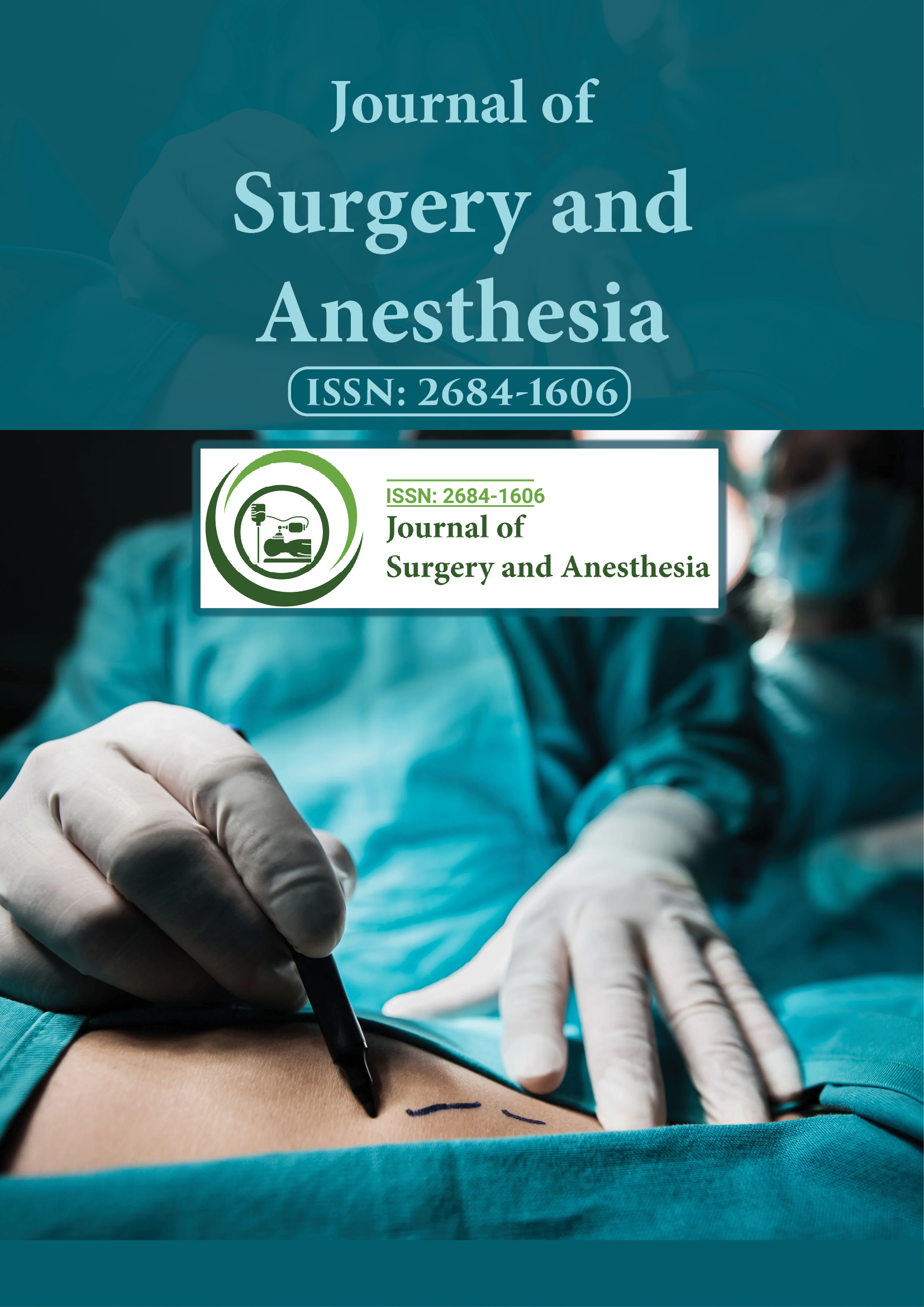Indexed In
- Google Scholar
Useful Links
Share This Page
Journal Flyer

Open Access Journals
- Agri and Aquaculture
- Biochemistry
- Bioinformatics & Systems Biology
- Business & Management
- Chemistry
- Clinical Sciences
- Engineering
- Food & Nutrition
- General Science
- Genetics & Molecular Biology
- Immunology & Microbiology
- Medical Sciences
- Neuroscience & Psychology
- Nursing & Health Care
- Pharmaceutical Sciences
Perspective - (2023) Volume 7, Issue 4
The Innovative Effect of Preoperative Anaesthesia Guidance in Neurosurgery
Cuvillon Baribeault*Received: 17-Nov-2023, Manuscript No. JSA-23-24087; Editor assigned: 20-Nov-2023, Pre QC No. JSA-23-24087 (PQ); Reviewed: 04-Dec-2023, QC No. JSA-23-24087; Revised: 11-Dec-2023, Manuscript No. JSA-23-24087 (R); Published: 18-Dec-2023, DOI: 10.35248/2684-1606.23.7.228
Description
Neurosurgical procedures often induces anxiety and concern due to their intricate nature and potential impact on the central nervous system. Recognizing the unique challenges posed by neurosurgery, preoperative anesthesia counseling plays a pivotal role in preparing patients for the upcoming procedures. This article explores the significance of preoperative anesthesia counseling specifically adjust for neurosurgical patients, emphasizing its role in enhancing patient understanding, alleviating anxiety, and optimizing perioperative outcomes.
Neurosurgery encompasses a diverse range of procedures, from brain and spinal cord surgeries to peripheral nerve interventions. The delicate nature of the central nervous system necessitates meticulous planning and a comprehensive approach to perioperative care. Preoperative anesthesia counseling emerges as a key component in ensuring not only the patient's physical readiness but also their mental and emotional preparedness for the neurosurgical phase. Preoperative anesthesia counseling serves as an opportunity to educate neurosurgical patients about the anesthesia process. This includes explaining the different types of anesthesia options, such as general anesthesia or neuraxial techniques, and discussing the potential benefits and risks associated with each. Providing this information helps demystify the anesthesia experience and enables patients to make informed decisions about their care. Neurosurgical procedures often evoke heightened anxiety due to the perceived complexity and potential impact on cognitive function. Anesthesia counseling allows healthcare providers to address patient concerns, clarify misconceptions, and provide reassurance regarding the safety and efficacy of anesthesia in neurosurgical settings. This personalized approach helps build trust between patients and the healthcare team. Neurosurgical patients may have specific concerns about postoperative recovery, including pain management, potential complications, and the duration of the recovery process. Preoperative anesthesia counseling provides an opportunity to set realistic expectations, discuss pain management strategies, and outline the postoperative care plan.
This proactive communication fosters a sense of control and empowerment for patients facing neurosurgical interventions. Neurosurgical patients often present with complex medical histories and comorbidities that may impact their response to anesthesia. Preoperative counseling allows healthcare providers to assess and mitigate potential risk factors, tailor anesthesia plans to individual patient needs, and implement strategies to optimize perioperative outcomes. This personalized risk assessment contributes to the overall safety and success of neurosurgical procedures. Informed consent is a fundamental aspect of medical ethics, and preoperative anesthesia counseling plays a vital role in ensuring patients have a comprehensive understanding of the procedures they will undergo. This includes discussing potential complications related to anesthesia, addressing any specific risks associated with neurosurgical interventions, and obtaining informed consent in a thorough and transparent manner. Patients who receive thorough preoperative anesthesia counseling often report higher levels of satisfaction with their overall surgical experience. Feeling informed and actively involved in decision-making contributes to a positive patient experience and fosters a sense of trust in the healthcare team. Neurosurgical patients may experience heightened anxiety before their procedures. Effective preoperative anesthesia counseling has been shown to significantly reduce preoperative anxiety, leading to a more relaxed and cooperative patient on the day of surgery. This, in turn, positively influences the patient's response to anesthesia and contributes to smoother perioperative care. An informed and prepared patient is better equipped to navigate the challenges of the perioperative period. Preoperative anesthesia counseling contributes to enhanced recovery by addressing patient concerns, optimizing pain management strategies, and minimizing potential complications. This holistic approach positively influences neurosurgical outcomes. The collaborative nature of preoperative anesthesia counseling encourages shared decision-making between healthcare providers and patients. By involving patients in the decision-making process, healthcare providers can tailor anesthesia plans to individual preferences and needs, fostering a sense of autonomy and control. Through detailed preoperative counseling, healthcare providers can identify and address potential issues or concerns before they escalate. This proactive approach allows for the timely implementation of interventions, contributing to the overall safety and success of neurosurgical procedures. Preoperative anesthesia counseling stands as a foundation in the comprehensive care of neurosurgical patients. By providing alter education, addressing patient concerns, and promoting a collaborative approach to decisionmaking, healthcare providers can significantly enhance the overall patient experience and contribute to improved perioperative outcomes. In the branch of neurosurgery, where the stakes are high and patient apprehension is common, the role of preoperative anesthesia counseling cannot be overstated. It is not merely a preparatory step; rather, it is an essential component of patient-centered care that empowers individuals to actively participate in their healthcare journey. As the field continues to advance, integrating effective preoperative anesthesia counseling into the standard of care for neurosurgical patients remains foremost for optimizing both the patient experience and clinical outcomes.
Citation: Baribeault C (2023) The Innovative Effect of Preoperative Anaesthesia Guidance in Neurosurgery. J Surg Anesth. 7:228.
Copyright: © 2023 Baribeault C. This is an open access article distributed under the terms of the Creative Commons Attribution License, which permits unrestricted use, distribution, and reproduction in any medium, provided the original author and source are credited.
